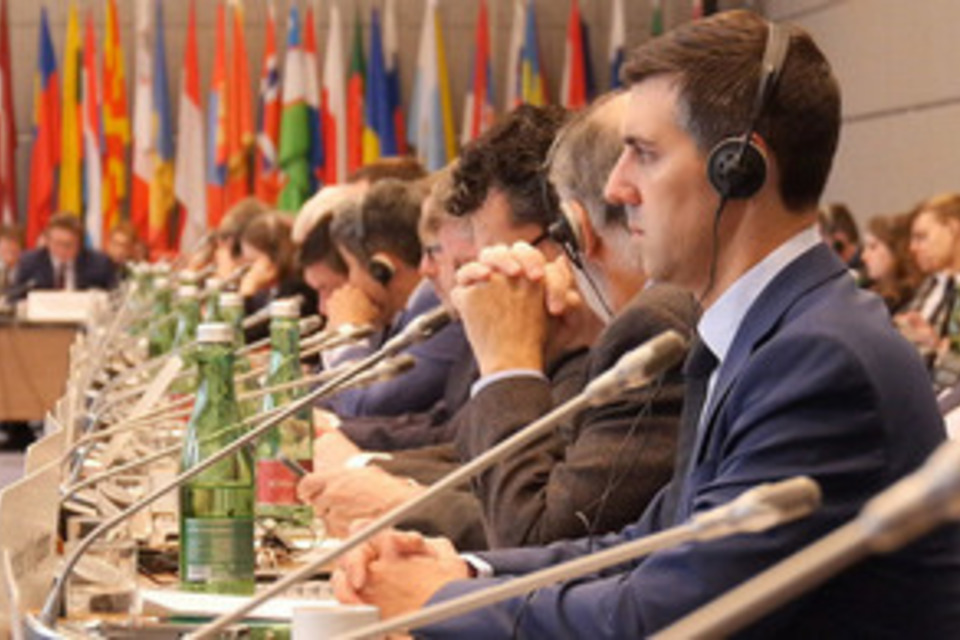Seventh anniversary of Russia’s illegal annexation of Crimea: UK statement
Ambassador Neil Bush speaks about Russia's illegal annexation of Crimea in 2014 at the OSCE Permanent Council.

Thank you Chair. I’d like to thank the esteemed Ukrainian Ambassador for raising this important issue and reiterate the UK’s unwavering support for the sovereignty, unity and territorial integrity of Ukraine within its international borders, including its territorial waters.
Seven years ago, on the 20 February, Russia’s military operation to illegally seize 10,000 square miles of Ukrainian territory began. In blatant violation of its OSCE principles and commitments, Russia deployed military troops to the Crimean peninsula, which the Kremlin had decided to take by force. Russia then tried to give its actions a veneer of legitimacy with a sham referendum. This so-called referendum was conducted in a heavily militarised environment; was clearly illegal under the Ukrainian Constitution; and the result remains unrecognised by the international community.
In Crimea, Russia violated the first principle of international law – that countries may not acquire territory or change borders by force. Russia’s actions flagrantly violated its own international commitments including in: Article 2 of the United Nations Charter, the Helsinki Final Act and the Budapest memorandum. Their actions undermined and continue to undermine the security of us all. The passage of time will never make them acceptable.
Sadly, both people living in Crimea, and those who have been forced to flee by Russia’s persecution, continue to suffer from Russia’s ongoing illegal annexation. The de-facto authorities persecute and restrict the fundamental freedoms of ethnic and religious groups, including Crimean Tatars, with arbitrary arrests, torture and intimidation. At least 109 Ukrainian political prisoners remain in detention in Russia and Crimea.
Ukrainians, Crimean Tatars and other ethnic and religious groups also continue to face cultural discrimination. Education in Ukrainian and Crimean Tatar languages is being ever more restricted. Despite a 2017 International Court of Justice order, that the Mejlis should be allowed to resume its activities, the organisation remains banned in Crimea. We call on Russia to uphold this international ruling and to immediately end its persecution of the Crimean Tatar community, Ukrainians and all ethnic and religious communities in illegally annexed Crimea.
The UK condemns Russia’s ongoing militarisation of Crimea, the Sea of Azov and the Black Sea. Since 2015, Russia has conscripted 28,000 residents of Crimea. They have stationed at least 32,500 military personnel in Crimea and deployed advanced weaponry and missile warning systems there. We are concerned by reports that there are currently 13 Kalibr missile capable vessels in service in the Black Sea Fleet, with a further 11 being built. Moreover, Belbek Airfield near Sevastopol has been lengthened, specifically for military use. Other military bases, radar stations and S-400 sites continue to be built.
Russia’s military exercises in the Black Sea are not only destabilising regional security but also have a significant economic impact. At times, these exercises have cut off over 25% of the Black Sea, disrupting the transit of shipping. In both the Black Sea and the Sea of Azov, Russia’s ships are intentionally obstructing traffic, and violating the right of passage. Moreover, the bridges built over the Kerch Strait limit the size of vessels able to transit and were constructed without Ukraine’s consent and in contravention of international law. These restrictions are part of a wider strategy to disrupt Ukraine’s economy and destabilise Ukraine.
Russia vainly attempts to hide all these violations by suppressing independent media, persecuting journalists and refusing access to the peninsula for mandated international missions, such as the OSCE Special Monitoring Mission and the UN Human Rights Monitoring Mission.
It is clear that Crimea must remain high on the international agenda, and that Russia must be continually held to account for its actions on the peninsula. The UK therefore welcomes the new International Crimean Platform. We support Ukraine’s initiative to bring together the international community to keep the spotlight on Crimea and support its return to Ukraine.
The UK does not and will not recognise Russia’s illegal annexation of Crimea. We condemn Russia’s ongoing violation of Ukraine’s sovereignty and territorial integrity. We call on Russia in the strongest terms to respect international law and OSCE principles and commitments and to return Crimea to its rightful place under Ukrainian government control. Until they do so, their actions will continue to have consequences, including through a robust package of sanctions. Crimea is Ukraine.